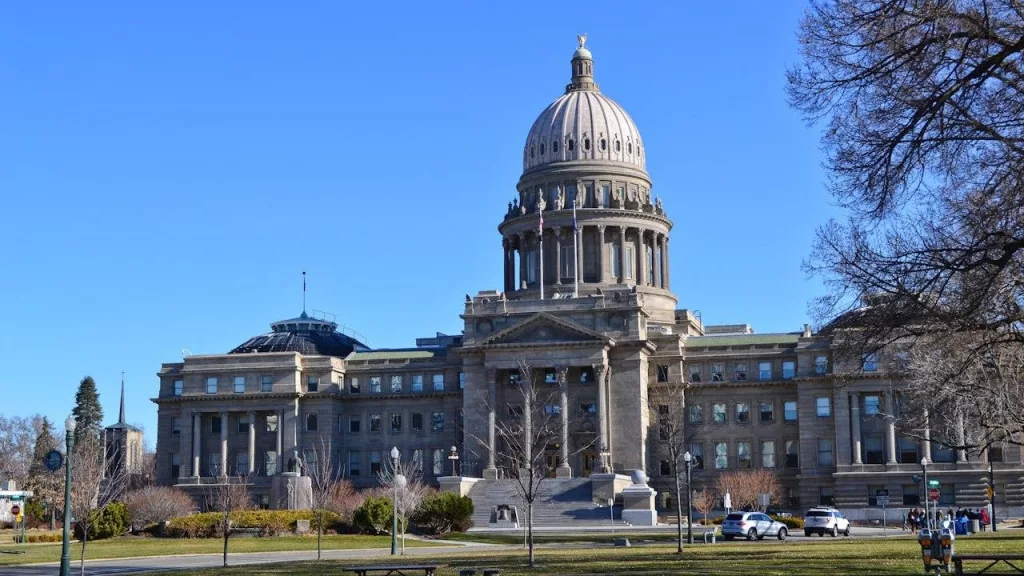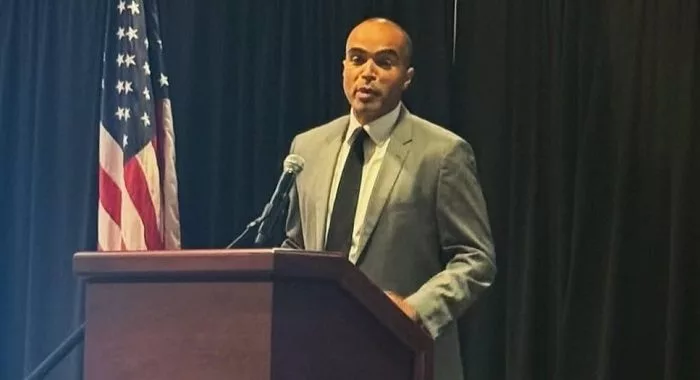Originally posted on IdahoEdNews.org on April 7, 2025
BOISE, ID – The 89-day blur that was the 2025 legislative session came to a conclusion Friday afternoon.
So let’s take a step back and recap.
What passed — and how will it affect taxpayers, parents, teachers and K-12 and higher ed administrators?
And what didn’t pass — but could resurface when lawmakers return, in 39 weeks, for the blur that will be the 2026 session?
What passed, in K-12 funding
The debate over private school choice grabbed most of the oxygen. But it was one of several laws that will change the way dollars flow in education.
House Bill 93. Idaho’s first private school choice program, the Parental Choice Tax Credit provides non-public school students up to $5,000 in refundable tax credits — and up to $7,500 for special needs students. The program is capped at $50 million, and families that earn 300% or below the federal poverty level — about $96,000 per year for a family of four — will have priority access when applications open in January.
Empowering Parents repeal. The Empowering Parents program would be extinct by 2028, under a bill on Little’s desk. (He had not acted on the bill as of Monday afternoon, and his deadline is 12:26 p.m. Thursday.) Lawmakers passed a bill phasing out the microgrants in the waning days of the session. Supporters of repealing the $30 million program argued that it has outlived its original purpose — to cover home-learning costs during the COVID-19 pandemic — and has become a “slush fund” for laptops and other electronics.
No new money would be added to the Empowering Parents fund, and recipients of awards issued this year would have until 2028 to spend the cash.
Transportation funding. The state’s K-12 transportation funding formula will allow reimbursements for vans and other passenger vehicles. Supporters said this change would save districts money, allowing them to use more cost-effective vehicles for offsite activities rather than relying on yellow school buses.
Staff allowance. Lawmakers eliminated a portion of a state law that penalized districts for above average teacher-to-student ratios.
Advanced Opportunities updates/clarifications. House Bill 175 clarified that students can use Advanced Opportunities funding to take college entrance exams more than once. It also allowed home-school students to take dual-credit classes directly through community colleges and required that students meet with a college and career counselor after they have earned 15 dual credits through the program.
What passed, in K-12 curriculum
On the school curriculum front, a new required class for graduating seniors was largely overshadowed by debates over instruction on sexuality and gender.
New graduation requirements. Lawmakers partially approved state superintendent Debbie Critchfield’s proposed graduation requirement changes. While the Legislature agreed to add a new digital literacy class, the Senate and House Education committees rejected Critchfield’s proposal to drop an existing communication requirement.
Ban on LGBTQ+ education. Public school teachers can no longer offer instruction on sexual orientation or gender identity. Nearly every Republican in the Legislature supported the prohibition on LGBTQ+ issues, which applies to K-12 public schools.
Early fetal development videos. Fifth through 12th grade instruction on human biology, contraception or sexually transmitted diseases must now include videos showing the development of a fetus. The videos must be “a high-definition ultrasound video … showing the development of the brain, heart, sex organs, and other vital organs in early fetal development” along with “a high-quality, computer-generated rendering or animation showing the process of fertilization and every stage of human development inside the uterus,” according to Senate Bill 1046. The bill’s sponsors, Sen. Tammy Nichols, R-Middleton, and Rep. Heather Scott, R-Blanchard, shared one example. The three-minute, computer-generated rendering, produced by anti-abortion group Live Action, says that life begins at conception.
Sex-ed opt-in. Schools must obtain parental consent before instruction on human sexuality. Currently, parents can opt out of sex education, but Rep. Barbara Ehardt’s, R-Idaho Falls, bill made it opt-in.
Civics test. Lawmakers directed the Department of Education to develop a new civics test that asks about the impact of Western civilization on the country’s founding, the arguments presented in the Declaration of Independence, the governing principles in the United States and Idaho constitutions and the roles and powers of separate branches of government, among other things.
English language amendment. In November 2026, Idaho voters will be asked whether the state constitution should include a provision designating English as the state’s official language. The provision would apply to schools. It would read: “Except as required by federal law, English shall be used in all public proceedings, public documents, public instruction, and any other public acts of any public institution in the state of Idaho.”
Cursive handwriting. Starting next school year, public schools must test students’ proficiency in cursive handwriting. Students who aren’t proficient by fifth grade must receive “additional instruction until such proficiency is demonstrated,” says Senate Bill 1044.
What passed, on the school policy front
Flags in schools. After several previous attempts in recent years, lawmakers passed a bill that banned from public school classrooms flags or banners representing political, religious or ideological viewpoints. The law specifically prohibits representations of political parties, race, gender, sexual orientation and political ideologies.
The bill includes a lengthy list of flags and banners exempt from the restrictions. These include official flags of states, nations — except foreign nations engaged in “hostile action” with the U.S. — and Native American tribes along with banners representing official school mascots.
School board meetings. A new law would require trustees to take public comment — on any topic, whether it appears on a school board agenda or not.
School board spousal employment. Lawmakers relaxed existing restrictions on hiring spouses of school board members in small districts. The updated law will allow spousal hires without a requirement that the job be posted every year in districts with 400 or fewer students.
Severe behavior enrollment. An updated law gives school boards more flexibility when considering enrollment for students with “severe” behavior issues.
Cellphone policies. A new law directs school districts to implement policies restricting cellphone use on school grounds.
What passed, affecting K-12 teachers
Literacy, money for coaching. Teachers statewide will now have access to coaching on the science of reading, after a pilot training program in a handful of districts proved effective at improving literacy. Senate Bill 1069 set aside $5 million annually over the next three years to fund the coaching.
Lifetime educator certificate. Teachers and administrators can apply for a lifetime certificate after 25 years of experience. This certificate essentially exempts them from renewal training.
5% raises. Lawmakers put an additional 5% into salaries for K-12 teachers, administrators and staff. Altogether, districts will get an additional $85 million, but salaries are set at the local level, which means all school employees may not get 5% raises.
What passed, on child care
Child care deregulation. Local governments can no longer regulate child care centers beyond the state’s rules. House Bill 243 also relaxed the state’s staff-to-child ratios, allowing centers to oversee additional children.
What passed, on health-related issues
Five years after COVID-19 shook Idaho schools, legislators passed several bills rooted in the pandemic debate.
Medical freedom. K-12 schools, colleges and universities — both public and private — can’t require “medical interventions” for students, staff and visitors. Interventions include vaccines along with any treatment, medication or “medical action taken to diagnose, prevent or cure a disease or alter the health or biological function of a person.”
The bill did not supersede existing laws that allow administrators to close schools during a disease outbreak or send home students who are diagnosed with or suspected of having a contagious disease.
Mask mandates. Schools cannot require masks to curb the spread of infectious diseases. House Bill 32 took effect immediately after Gov. Brad Little signed it into law.
Immunizations. A new law puts all of Idaho’s immunization guidelines under legislative control. The law doesn’t change the guidelines — including language that allows parents to opt their children out of immunizations simply by signing a note. But these guidelines will now be part of state law, which means legislators can change them in the future, simply by passing a bill.
What passed in higher education
From DEI to WWAMI — and beyond. Here’s a recap from a session of emotionally charged higher education debates.
Diversity, equity and inclusion. In the final hours of the session, the Legislature passed a bill designed to purge DEI from Idaho’s college and university campuses. The bill bans DEI programs and offices, outlaws diversity training and prohibits DEI in hiring and admissions. Colleges and universities could face budget cuts or civil penalties if they violate the law. Gov. Brad Little signed the bill Friday.
Higher education budget cuts. The DEI backlash also played into the budgeting process. Lawmakers cut $2 million apiece from the University of Idaho and Boise State University. Some lawmakers called the cuts punitive. Nonetheless, they passed overwhelmingly.
Medical education. First, lawmakers flirted with severing their ties with WWAMI — the Washington, Wyoming, Alaska, Montana and Idaho medical education partnership. Then they walked it back. The bill that passed would require Idaho to add 30 taxpayer-subsidized medical school seats over the next three years. A State Board of Education working group will decide what to do with WWAMI, a University of Washington-led program that has trained Idaho students since 1972.
Transgender students and dorm rooms. A new law would bar transgender students from using campus facilities aligned with their gender identity. The law reads, in part: “No individual shall enter a restroom, changing room, or sleeping quarters that is designated for females or males unless such individual is a member of that sex.” This goes into effect on July 1.
Campus free speech. An attempt to safeguard “the protected expressive activity of any member of the campus community,” a new state law bans campus free speech zones.
Community college tuition. The Legislature raised this tuition cap for the first time since 2008. The old cap was $2,500 a year. The new cap is $3,250.
Title IX. A new law addresses campus compliance with Title IX, the federal law prohibiting discrimination based on sex. College and university presidents — or a designee reporting to the president — will oversee Title IX issues.
What didn’t pass
No recap of a legislative session would be complete without looking at what lawmakers discussed — but didn’t pass.
Here’s a rundown of the education bills that ended up on the cutting room floor.
Funding formula rewrite. Another year came and went without a change to a K-12 funding formula that has been unchanged since 1994. The Senate passed a bill that would have moved about $400 million into a weighted formula — providing additional money to serve special education students, English language learners and other high-needs students. The House never heard it, and the House didn’t move a competing bill that would have committed the state to adopt a weighted formula sometime in the future.
High-needs student funding. Legislators were sharply split on a $3 million special education bill. The funding would have covered costs for some students who need full-time aides, for example. Opponents said they worried that the narrow program would morph into a costlier plan to address Idaho’s $82 million special education budget gap. This bill narrowly passed the House before dying in the Senate by a single vote.
Idaho Launch makeover. The House passed a bill that would have revamped Launch, the controversial program that provides high school graduates with up to $8,000 in financial aid. House members wanted to emphasize short-term job training and workforce development — not four-year college degrees. The Senate never heard the bill, so the program will remain unchanged for this year’s graduating class.
Career-technical grants. Gov. Brad Little wanted $15 million to help build up Idaho’s overcrowded career-technical programs. The grants would have covered the state’s end of private-public partnerships. But the idea never got traction. First, the Joint Finance-Appropriations Committee whittled the request to $5 million. Then, the House killed the funding entirely.
School bond cap. The House rejected a bill that would have allowed school districts to seek larger bond issues. The bill would have allowed districts to bond for up to a 8% of market value, instead of the current 5% cap.
Supplemental levies. The Senate unanimously passed a bill that would have allowed school districts to seek six-year supplemental tax levies. (In most cases, the cap is two years.) The House never heard the bill.
Outcomes-based funding. Another attempt to adopt outcomes-based school funding failed this session. The bill would have shifted $35 million into two areas: fifth- through eighth-grade math, and college and career readiness. The Senate passed the bill, but the House didn’t take it up.
School spending transparency. The House passed a bill that would have limited school districts’ spending flexibility. House Bill 416 said that state funding appropriated to schools “must be used for the intended purposes.” The bill didn’t get a hearing in the Senate Education Committee.
Virtual charter schools. A late-session bill would have moved virtual charter schools under the umbrella of the Idaho Public Charter School Commission. Charter school advocates vehemently opposed the bill, and it stalled out in the Senate.
Guns in schools. Another guns-in-school bill surfaced this year, but didn’t pass. This year’s version would have allowed employees with enhanced concealed weapons permits to carry guns in school.
Parental choice constitutional amendment. The House rejected a proposed amendment to the Idaho Constitution that would have replaced the compulsory education provision with a new provision shielding non-public schooling from government regulation.
Bible reading in school. The Idaho Family Policy Center’s bill would have required daily Bible reading in public schools. The House Education Committee introduced the proposal but didn’t give it a hearing.
Ten Commandments. Another bill would have encouraged in-school displays of the Ten Commandments. It was introduced in the House but it never received a hearing.
Chaplains in schools. The House passed a bill that would have allowed religious chaplains in public schools, but it died without a hearing in the Senate Education Committee.
Graduation requirements. A bill to give legislators the power to change high school graduation requirements surfaced, but never got a committee hearing.
Citizenship status for students. A pair of bills would have required schools to track the immigration status of their students. Neither bill made it out of the House Education Committee.
School safety advisory board revamp. The House Education Committee approved a bill that would have downsized the state’s School Safety and Security Advisory Board. But Rep. Ted Hill’s, R-Eagle, bill was sent back to the committee after a few days on the House’s calendar. Public school advocates opposed removing seats reserved for trustees and superintendents.
Taxpayer funds, teachers’ unions. The Legislature again considered a bill designed to keep school districts from using taxpayer resources to support teachers’ unions. For example, union representatives would no longer be able to take paid time off for union activities. The House passed this bill, but the Senate never heard it.
Legislative oversight of university president hires. Lawmakers briefly discussed the idea of giving themselves say over college and university presidents’ hires. But the House Education Committee was skeptical of the idea — proposed by the committee’s chair, Rep. Douglas Pickett, R-Oakley — and the bill was never even printed.
University of Phoenix acquisition. Last June, the State Board gave the University of Idaho an extension — more time to negotiate a deal to acquire Phoenix, with the Legislature’s support. But the U of I never presented a deal to lawmakers, suggesting the bid to acquire the for-profit online university could be dead.





